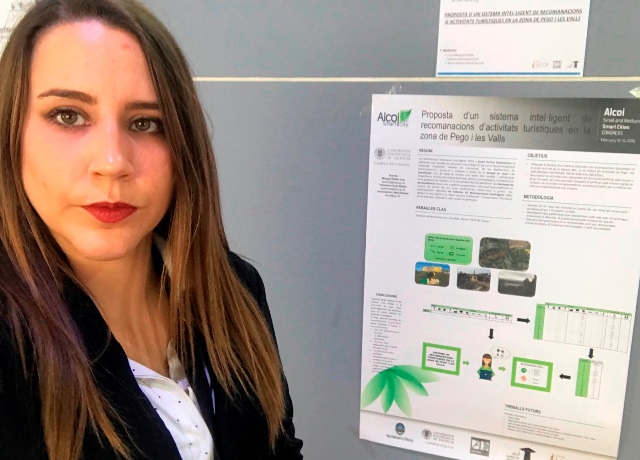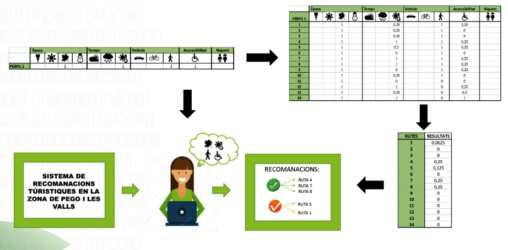Offer each visitor the routes that are best suited to their profile and the weather conditions in Pego and Les Valls. This is the purpose of the smart recommendations system developed by the graduate in Tourism from Campus Gandia of the Universitat Politècnica de València (UPV) Lara Mengual.
The tourismologist carried out the project for her Bachelor’s Degree Thesis, under the supervision of the professors of the Degree in Tourism, Lola Teruel and Alberto Palomares. The three of them have presented the study in several Smart-City related forums, and Lara is presenting her work to organizations that may be interested.

“This system recommends the most suitable activities according to the profile for each user or group of users, in the municipalities of Pego and Les Valls: Atzúbia, Vall de Alcalà, Vall de Gallinera and Vall d’Ebo. It highlights the most significant features of each route, and recommends the ones that best adapt to the profile of each visitor, as well as complementary activities, the optimal time to carry them out, the nearest complementary offer (accommodation, restaurants, bars), and also describes the flora and fauna of the area. The system also includes alerts to keep visitors informed in case of rains, floods, heat waves and areas under construction, among others,” explains Lara Mengual.
“To develop it, we selected the fourteen routes with the best conditions and proper signage for public and tourist use. Next, we determined the parameters that characterize each route, such as the route, the gradients, the difficulty, the approximate duration and the type of route. The gradient of most routes ranges from 200 to 700 meters. We have indicated whether children or people with reduced mobility can use the routes, and if they can be traveled by car, bike or on foot,” explains the graduate in Tourism.
SMART SYSTEM
To use this recommendation system, a questionnaire has been created where users can indicate the conditions in which they will carry out the route: time of year, time, vehicle, accessibility, children, etc… The system calculates the results to obtain a numerical value associated with each itinerary according to the user profile.

“This way, it recommends the routes with the highest numerical value, which indicate that they are the most appropriate for the profile of that particular user. In the event that there are more than one routes recommended, the user will have to choose, based on other parameters such as the duration of the route, the difficulty, the gradient… and select the one that best suits their tastes,” according Lara Mengual.
SMART RECOMMENDATION SYSTEMS FOR SMART CITIES
The graduate in Tourism affirms that the localities are accepting the challenge of becoming smart cities to improve and become more sustainable. “This improvement, in terms of the tourism sector, has different readings. One of them is to facilitate the tourist experience and serve as a conduit for the development and revitalization of the municipality,” says the Tourism specialist.
“The Smart Recommendations Systems have established themselves as powerful tools to help reduce the information overload that visitors have in the initial search processes,” says Lara Mengual. “These systems use different techniques to identify the services that best satisfy the preferences of the users. The recommendations are generated from the opinions provided by other users or from the user profile. Its function is to weed out useful information from a large quantity of information that the user could not fully analyze and are now used for different purposes, such as in decision-making, in e-commerce or, simply, in the websites related to the leisure,” says Lara Mengual.
Cover photo: Aguelo

